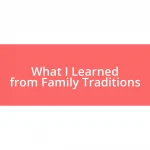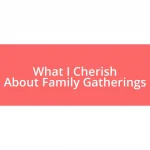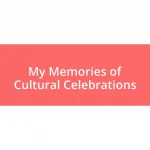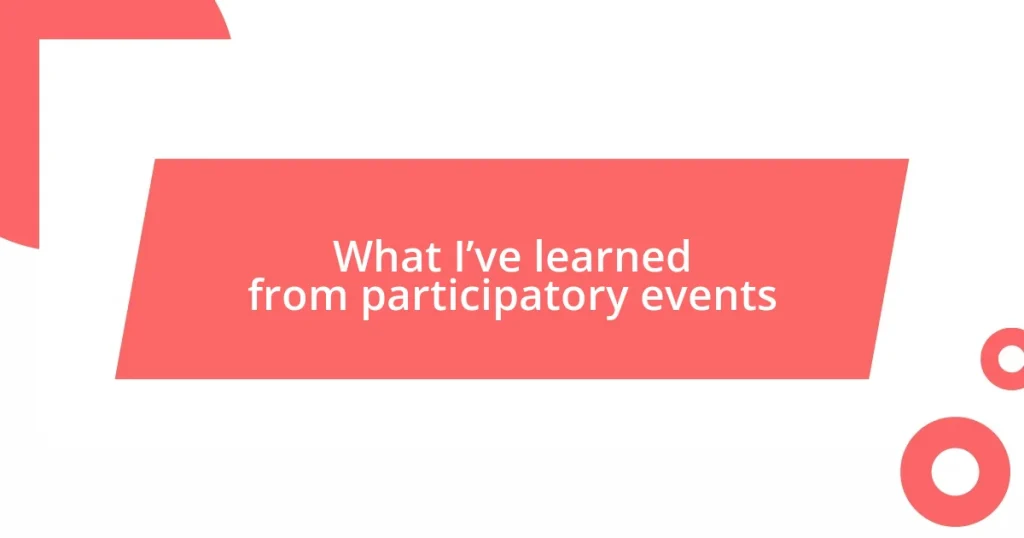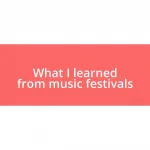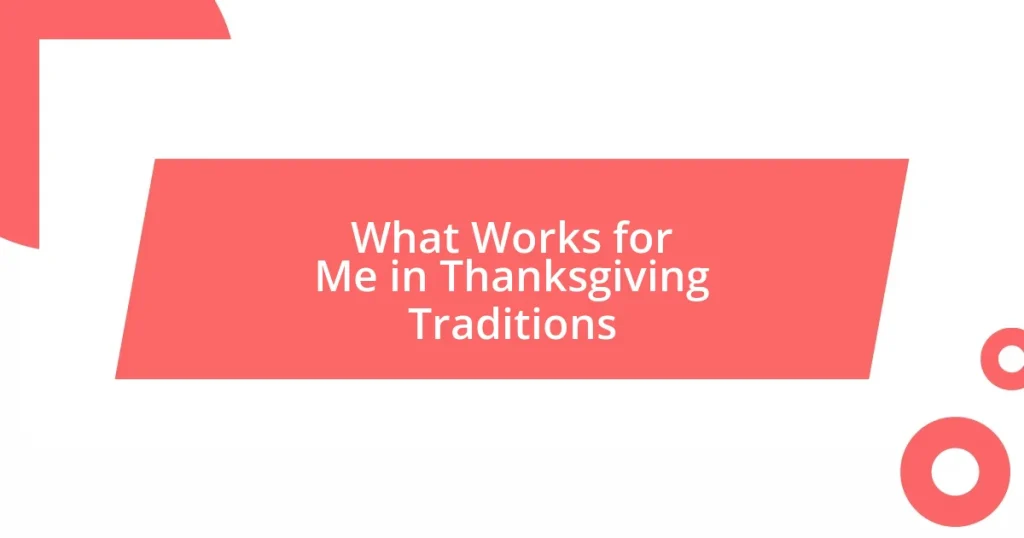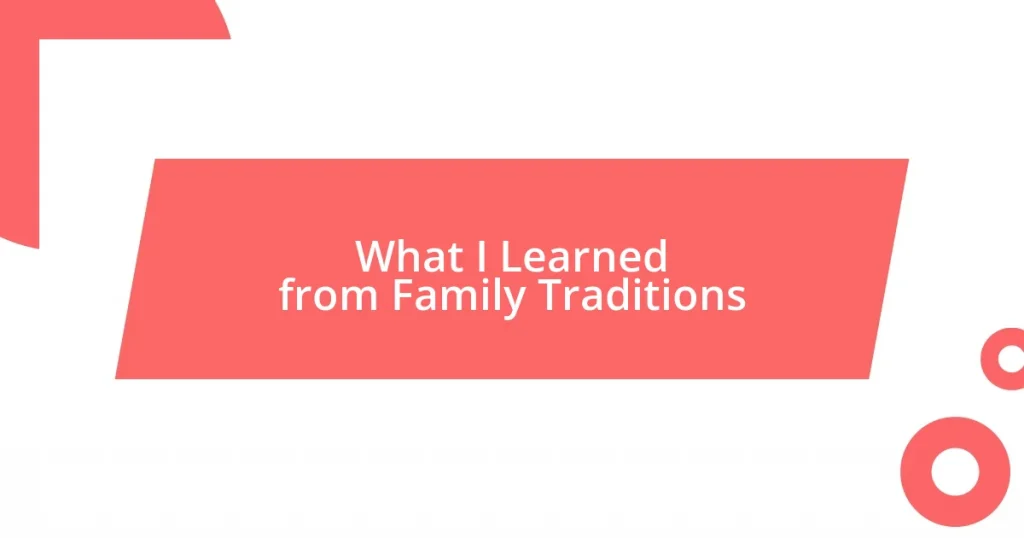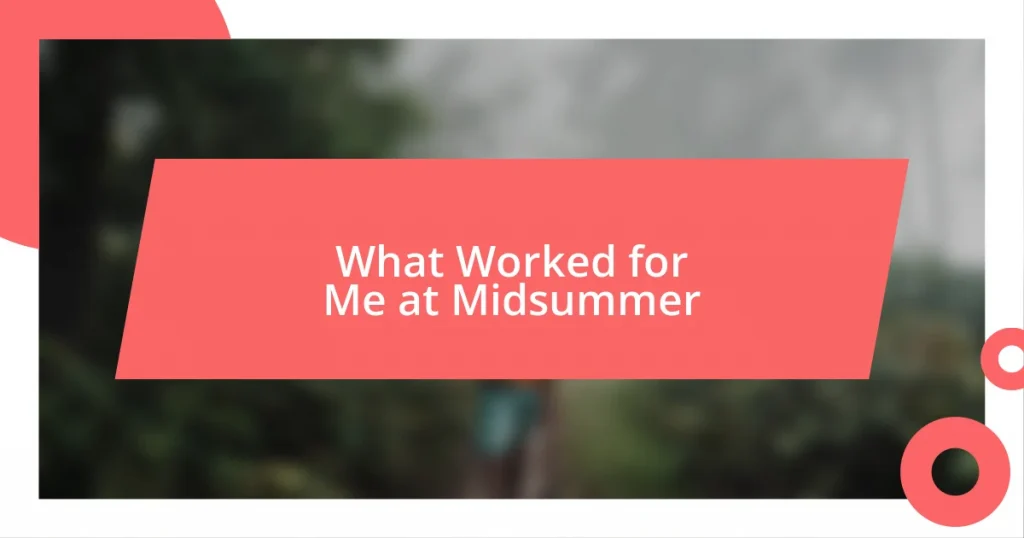Key takeaways:
- Participatory events empower individuals by fostering collaboration, encouraging creativity, and building community through diverse engagement.
- Key skills gained from participation include effective communication, adaptability to social dynamics, and critical thinking for quick decision-making.
- Evaluating event outcomes through feedback and reflection enhances future initiatives and encourages continuous improvement and engagement post-event.
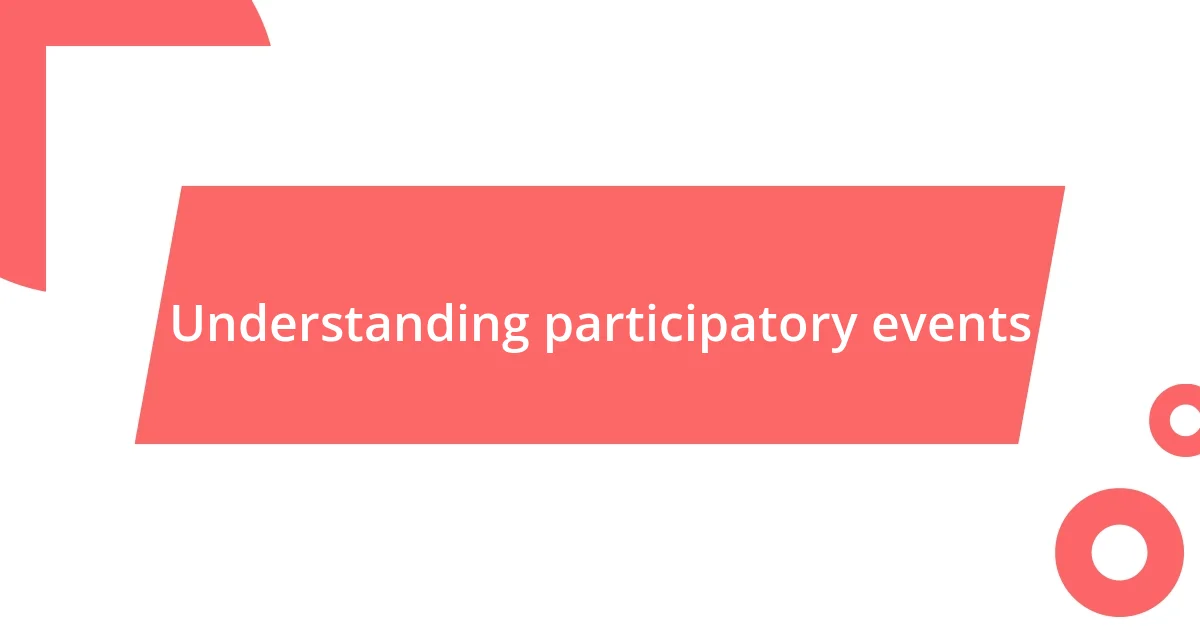
Understanding participatory events
Participatory events are essentially gatherings that encourage active engagement from individuals rather than passive observation. I still remember the first one I attended; I was struck by how empowering it felt to share my thoughts openly. Have you ever experienced a moment where your opinion truly influenced the outcome? It’s in these spaces that everyone’s voice can make a difference.
What fascinates me about these events is the diverse perspectives that come together. I recall a workshop where participants from various backgrounds came together to brainstorm solutions for a community issue. The conversations flowed, and suddenly, what seemed like isolated problems transformed into collective insights. Isn’t it incredible how collaboration sparks creativity and innovation?
In my experience, the emotional connections formed during these events are powerful. I often leave with a sense of belonging and motivation, feeling that I’m part of something bigger than myself. Have you ever felt that surge of energy from being surrounded by people who are just as passionate as you? It’s those shared moments that leave a lasting impact and drive meaningful change.
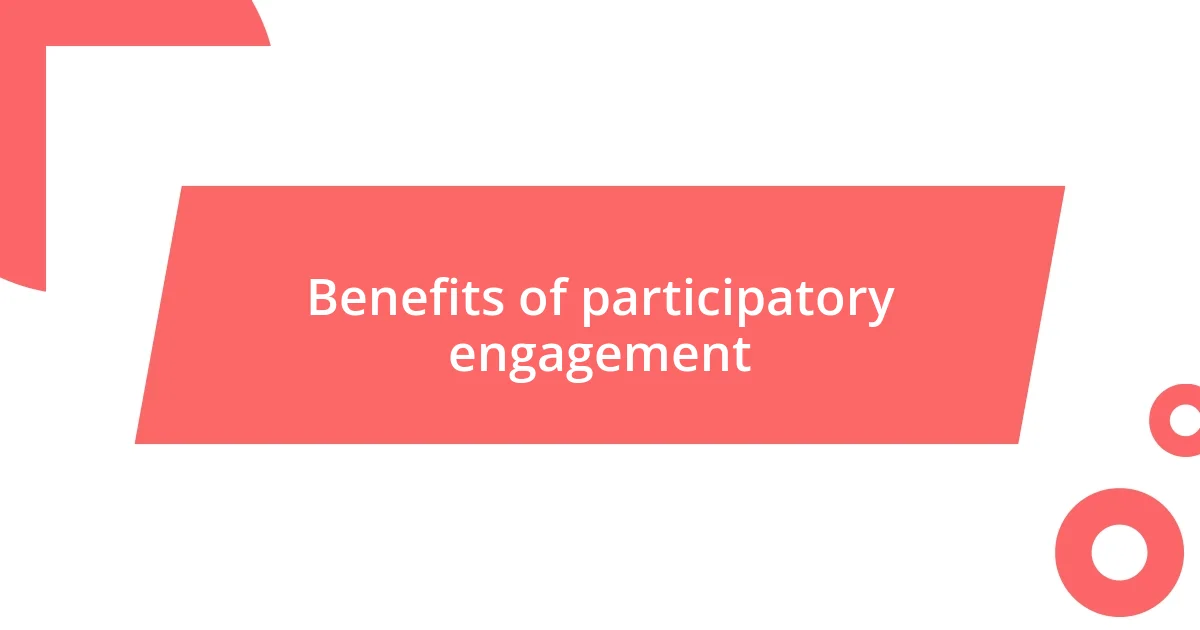
Benefits of participatory engagement
Participatory engagement opens doors to countless benefits that often go unnoticed at first glance. From my own encounters, I’ve found that the best ideas often emerge in these collaborative settings, where diverse voices challenge the status quo. I remember a vibrant brainstorming session where, through our collective efforts, we unearthed solutions that none of us could have envisioned alone. It was a transformative experience, reinforcing my belief in the power of shared knowledge.
Here are some key benefits of participatory engagement:
- Fosters collaboration: Bringing people together leads to relationships built on trust and understanding.
- Encourages creativity: Diverse perspectives spark innovative ideas and solutions.
- Empowers individuals: Participants feel valued, knowing their contributions matter.
- Builds community: There’s a palpable sense of connection, making everyone feel part of something larger.
- Enhances learning: Engaging with different viewpoints provides rich learning opportunities.
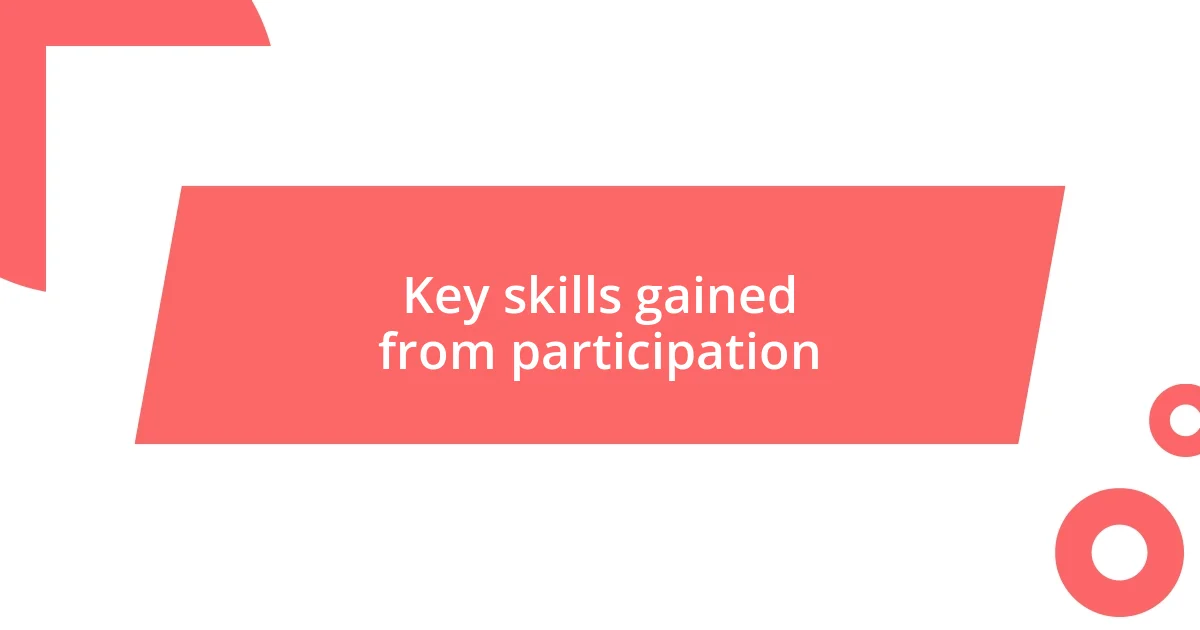
Key skills gained from participation
Participating in these events has taught me invaluable skills that extend beyond the gathering itself. I’ve noticed that effective communication emerges as a pivotal skill. For instance, during one event, I had to articulate my thoughts clearly to ensure my ideas were understood by others, especially when the room buzzed with diverse opinions. This experience cultivated my ability to listen actively and engage meaningfully, which I believe are cornerstones of effective collaboration.
Another vital skill I gained is the ability to adapt to different social dynamics. At a recent workshop, the atmosphere shifted when new participants joined. Initially, I felt a bit hesitant, but I quickly adapted my approach to foster inclusivity. This adaptability not only enhanced my interpersonal skills but also helped in creating an environment where everyone felt welcome to share. Have you ever found yourself adjusting your style to fit in? It’s fascinating how such moments can transform our interactions.
Lastly, I can’t overlook the importance of critical thinking. Participation often requires quick, strategic decision-making, a skill that was put to the test during a group exercise. I remember feeling the pressure to develop solutions on the spot, but in doing so, I honed my ability to analyze situations quickly and think outside the box. This skill continues to serve me incredibly well in both personal and professional realms.
| Skill | Description |
|---|---|
| Effective Communication | Articulating thoughts clearly and listening actively in discussions. |
| Adaptability | Adjusting personal styles to fit varying social dynamics during events. |
| Critical Thinking | Analyzing situations quickly and developing solutions under pressure. |
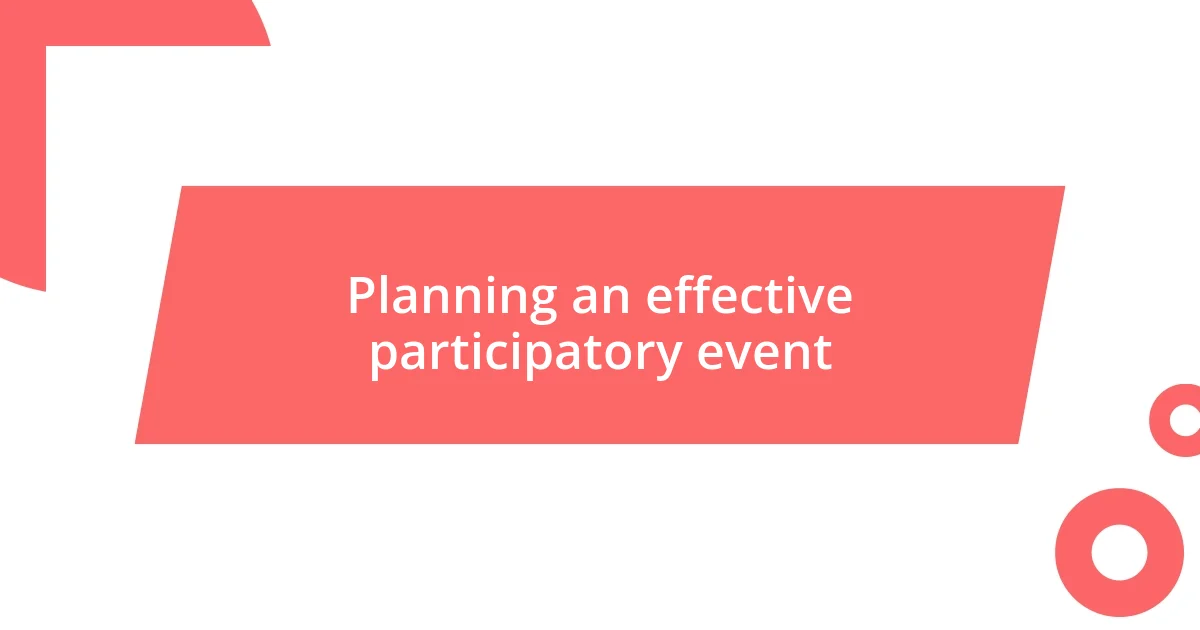
Planning an effective participatory event
When planning a participatory event, clarity of purpose is crucial. I remember a time when I attended a workshop that had a vague agenda; it left many participants confused and disengaged. Defining specific objectives not only helps orient discussions but also empowers participants to contribute meaningfully. What are you hoping to achieve? It’s essential to keep that front of mind as you plan.
Engaging the right mix of participants can make or break an event. I once organized a focus group that brought together individuals from various backgrounds. The diverse insights that emerged were nothing short of illuminating. Have you considered who you want in the room? The right mix fosters an environment where everyone feels empowered to share their unique experiences, leading to richer outcomes.
Another important aspect is designing activities that promote interaction. During a community brainstorming event, I witnessed how interactive exercises flourished into lively discussions. By breaking people into small groups, you create safe spaces for dialogue and creativity. It’s fascinating how simple activities, like icebreakers or collaborative tasks, can set the tone for openness and participation. What strategies will you employ to ensure everyone feels included?
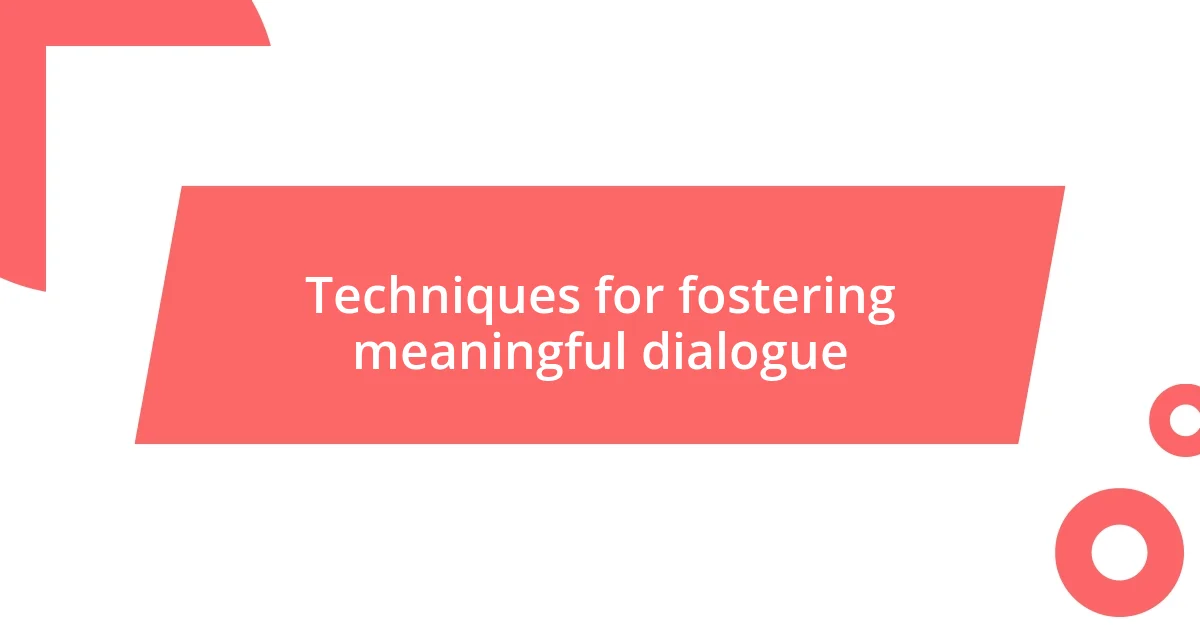
Techniques for fostering meaningful dialogue
Creating a space for meaningful dialogue often hinges on active listening. I recall a pivotal moment during a participatory event where I purposefully set aside my own thoughts to truly hear other participants. It was surprising how this shift not only made others feel valued but also opened up new perspectives I hadn’t considered before. Have you ever had a conversation that sparked a significant realization simply because you were fully present? This experience taught me that listening can be just as powerful as speaking.
Incorporating open-ended questions into discussions can dramatically elevate the quality of dialogue. At one workshop, I decided to pose a question that invited everyone to share their unique stories related to the topic at hand. The difference was palpable. Instead of simple yes or no responses, participants engaged in deeper explorations of their experiences. This shift turned a routine discussion into a rich narrative tapestry, highlighting how inviting others to reflect can lead to extraordinary insights. What questions could you ask to draw out valuable contributions?
Lastly, establishing ground rules for respect and openness is vital in fostering a safe environment. One event I attended instilled these principles right from the beginning, ensuring every voice mattered equally. I remember feeling a sense of relief knowing that I could express my thoughts without judgment. This clarity built trust among us, making it easier to tackle sensitive topics later. Have you ever felt the power of a well-established guideline in breaking down barriers? This simple technique can transform conversations, creating a foundation for genuine connection and collaboration.
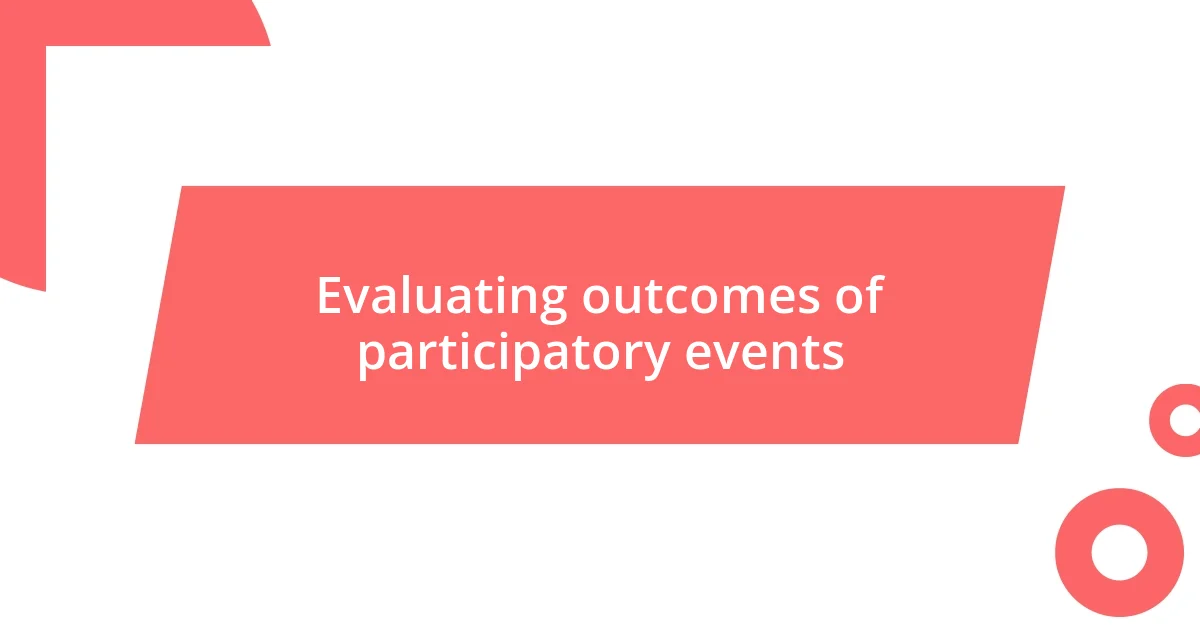
Evaluating outcomes of participatory events
Evaluating outcomes after a participatory event often reveals insights that can guide future initiatives. I once attended a community forum where feedback was gathered through surveys immediately after the event. Seeing the diverse reactions and suggestions from participants was eye-opening. It made me realize just how varied perspectives can be, validating that each person’s experience really does matter. Have you ever left an event and felt unsure about its impact? Gathering feedback promptly can clarify that uncertainty and provide a roadmap for improvement.
Analyzing the data collected can lead to surprising conclusions. Following a project aimed at enhancing local engagement, I reviewed participant feedback and noticed the recurring theme of wanting more interactive elements. This insight prompted me to reexamine how I structured discussions in future events. It’s interesting how numbers and words can intertwine, don’t you think? When you evaluate outcomes critically, you can uncover trends that might have otherwise gone unnoticed.
Ultimately, I believe that reflecting on what worked and what didn’t gives us the opportunity to grow. I remember a time when a participant’s critique highlighted a logistical oversight that had disrupted the flow of our discussions. Instead of being defensive, I embraced that feedback, knowing it was a chance to refine my approach. Have you taken the time to reflect on the outcomes of your events? By doing so, not only do we enhance our skills, but we also fuel the next round of meaningful dialogue.
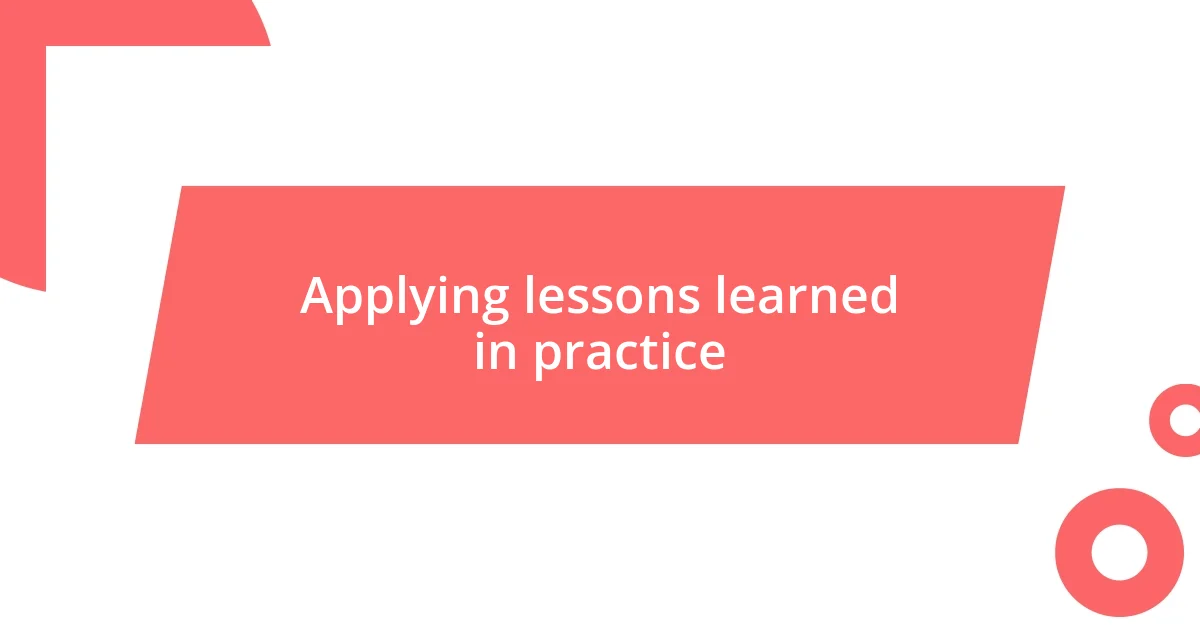
Applying lessons learned in practice
I’ve found that actively implementing the lessons learned from participatory events can revolutionize how we approach future initiatives. For instance, after a particularly engaging workshop, I made a conscious effort to incorporate more storytelling into my presentations. I noticed that sharing personal experiences not only resonated with the audience but also inspired them to open up. Have you ever shared a story only to discover it sparked a connection with others? This technique fostered a deeper dialogue, allowing participants to relate on a more human level.
Another lesson that profoundly shaped my practice was the value of adaptability. During one event, I had a meticulously planned agenda, but the discussion veered unexpectedly toward a pressing community issue. Instead of steering it back to my original plan, I chose to lean into that moment. The resulting conversation was richer and more impactful. Isn’t it fascinating how sometimes surrendering control can lead to magic? Embracing flexibility in our approach means we honor the participants’ voices, creating an environment where collaborative solutions can emerge.
Moreover, I’ve learned the importance of follow-up after participatory events. After an insightful session focused on local resources, I sent out a summary of key takeaways along with additional resources. The responses were overwhelmingly positive, showing that people appreciated the commitment to continuing the conversation. Have you ever left an event feeling like the momentum disappeared right after? Maintaining engagement post-event can bridge the gap between dialogue and tangible action, ensuring that the lessons learned don’t fade away.

